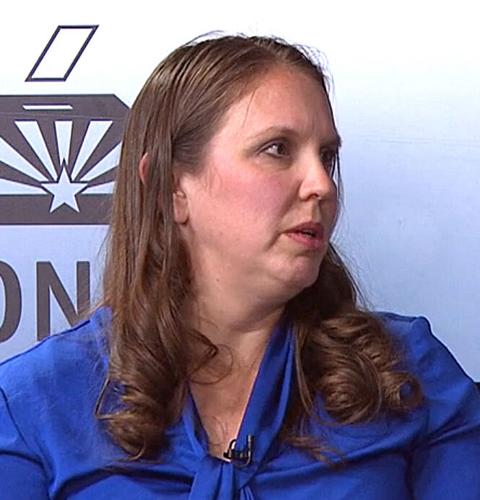PHOENIX т Thereтs little doubt the shooting earlier this month by a white teen at a Buffalo supermarket was racially motivated.
Legislation set for debate as early as this week in the УлшжжБВЅ Senate, however, makes it unclear whether it would preclude students in УлшжжБВЅ public schools from being told that the Buffalo shooter targeted the victims because they were Black.
тIтm not sure whether or not that would be an appropriate conversation in those classrooms,т Rep. Michelle Udall said during debate on HB 1412 last week.
But the Mesa Republican said she believes there is enough wiggle room in the language of her bill to allow for discussion т within limits.
тThis language says that they may not promote to advocate for, or blame or judgment of race or ethnicity,т she said. тI would hope that a teacher would not be in the classroom promoting or advocating that students judge based on race, as was done in that shooting.т
People are also reading…
And Udall said thatтs not a lot to ask.
тIтm pretty sure that teachers know how to teach about race and about race relations without placing blame or without saying that one race is morally superior to another,т she said. тAnd if you canтt do that, you really shouldnтt be teaching.т
Crossing the line
Itтs not that simple, says Rep. Jennifer Jermaine, D-Chandler.
She questioned how it is possible to teach history accurately without crossing the line т a line that actually could result in a teacher losing state certification.
тOur history is full of systems that have been based on one race thinking they are above others,т she said.
Jermaine said she sees it through the eyes of being a descendant of someone who survived the system of Indian boarding schools that resulted in the death and abuse of many Native American children.
тThe entire system is built on race and sex and targeting of minority populations,т she said.
Rep. Mitzi Epstein, D-Tempe, acknowledged the language in does specifically say that both teachers and guest lecturers can discuss prior instances of racial hatred or discrimination, including slavery, Indian removal, Japanese-American internment and the Holocaust.
But she said none of that matters with the curbs in the measure.
тWe canтt ask our children to recognize a problem, and we canтt ask them to recognize badness, if we donтt teach them something is bad,т Epstein said. And she specifically questioned how a survivor of the Nazi death camps speaking to students could convey his experience without saying that he was targeted because he was Jewish.
Facts, not racial тspinт
At the heart of the debate is whether SB 1412 is simply a safeguard against what Udall says as students not being indoctrinated to see everything through the lens of racism or, as some Democrats see it, a bid by the Republican majority to sanitize the nationтs often-checkered history with race.
On the surface, what is now awaiting Senate action is relatively simple.
It prohibits teachers from promoting or advocating the concept that blame or judgment can be ascribed based on race or ethnicity. It also would ban teaching that any race or ethnic group is morally or intellectually superior to another, that individuals bear responsibility for actions of others of the same race, and that any race or ethnicity is inherently oppressive, whether conscious or unconscious.
House Minority Leader Reginald Bolding, D-Laveen, however, worried that the law could be used to squelch legitimate discussion.
Consider, he said, a discussion of the Fair Housing Act, the 1968 federal law designed to prevent discrimination in the ability of people being able to buy and rent homes and apartment.
тA student might ask, тWhy?т or тHow,т т he said. And thatтs when you start to have a deeper discussion of why a federal law was needed in the first place.
Udall, however, insisted that facts can be told without putting a racial spin on it.
Her example of where lessons cross the line goes to an essay used in a seventh grade English class in Chandler entitled тBlack Men in Public Places,т told from that personтs point of view.
It deals with a 6-foot-2-inch Black man walking at night in a military style jacket with his hands in his pockets.
тA woman out walking was frightened and sought to put distance between them,т she said.
тHe attributes to that that she was racist,т Udall said. тI think thatтs absurd.т
Udall said she is a woman who walks or runs at night.
тIf thereтs a big guy near me, Iтm going to run from him,т she said. тIтm going to distance myself because you have to be careful when youтre walking alone at night.т
тEverything can be seen as a racist actт
Still, in a conversation with Capitol Media Services, Udall acknowledged that this is not a race-neutral society. Consider traffic stops.
тYou do see minorities are stopped more often and, in more minor situations, are stopped or ticketed or charged,т she said. тBut I donтt think thatтs just white police officers actually.т
And that, Udall said, proves her point that not everything can be seen as a racist act.
тItтs not the color of the police officersт skin thatтs a problem,т she said. тItтs their actions that are a problem.т
And while Udall said Derick Chauvin, convicted of killing George Floyd in Minneapolis, was white, one of the officers at the scene was Black; another was Hispanic.
Some of the concern by foes appears to have less to do with what SB 1412 would prohibit than what would be the effect.
It starts with the fact that any parent or even student can file a complaint that automatically triggers an investigation at the school district level but with the potential of it making its way to the state Board of Education where a teacher could lose his or her state certification.
And Rep. Domingo DeGrazia, D-УлшжжБВЅ, said he can envision situations where some legislators get constituents тriled upт over issues and тmake more noise.т
тSo what youтre going to see is an avalanche of complaints based on тfeelsт in our public schools that are going to have to be dealt with,т he said.
тBill is being misrepresentedт
Itтs not just teachers that could get into trouble. Schools that allow prohibited behavior are subject to fines of $5,000 a day, all of which Rep. Andres Cano, D-УлшжжБВЅ, said will тsubject our public school educators to intimidation, to harassment.т
And Rep. Kelli Butler, D-Paradise Valley said that will have an effect on what students are taught.
тIтm just worried that itтs going to create a situation in classrooms where teachers are just afraid of teaching anything,т she said, saying just the threats of deciding wrong т including loss of license т will have a тchilling effect.т
But Rep. John Kavanagh, R-Fountain Hills, said thatтs not the fault of SB 1412.
тIf thereтs a chilling effect on teachers, itтs not because of what the bill says,т he said.
тItтs because of how the bill is being misrepresented,т Kavanagh continued, saying all it precludes is advocacy or promotion of тseven vile, racist actions,т like some people being inherently superior because of their race.
There are other concerns
One is that SB 1412 covers not just K-12 education in public schools but also what is taught at community colleges and universities. But Udall said that restriction applies only to what is in teacher-training programs.
Udall has made several changes since her original version was approved by the House earlier this year but got stuck in the Senate. For one, it included not just race and ethnicity but also sex.
But Udall said that created problems, particularly as it comes on the heels of lawmakers approving legislation prohibiting those born male to participate in female sports because they are inherently stronger.
Also gone is language that would have made it illegal to teach that anyone should feel тdiscomfort, guilt, anguish or any other form of psychological distressт because of that personтs race or ethnicity.
That had raised questions from Rep. Jennifer Pawlik, D-Chandler, about what would happen if a history lesson about past discrimination just happens to make a student uncomfortable.
Howard Fischer is a veteran journalist who has been reporting since 1970 and covering state politics and the Legislature since 1982. Follow him on Twitter at т@azcapmediaт or email azcapmedia@gmail.com.















